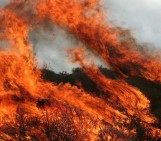Paulo Pereira
pereiraub@gmail.com
Mykolas Romeris University, Lithuania
The Environmental Management Centre
The Environmental Management Centre (EMC) was founded in 2013 at Mykolas Romeris University, Vilnius, Lithuania. The group is composed by young and proactive researchers from the entire world. The centre has an interdisplinary vision of science and aims to connect environmental, sociological and economical questions, in order to understand environmental questions from a wide perspective. The areas of research of the centre are, land use management and territorial planning, environmental economics, sustainable development, climate change and urban environment. The EMC members have experienced in the organization of international events as the 4th International Meeting of Fire Effects on Soil Properties (FESP4) and in European Geoscience Union Assembly and work with other scientific groups.
Research
In the previous years, the members of the EMC studied the effects of grassland fires on ash thickness, soil properties and vegetation recuperation. From this work, some papers have been published in international conferences and journals. The most important results were that ash thickness decreases rapidly in the first weeks after the fire. The ash produced at high severity (white and light grey) is easily transported by the wind and it is (re)distributed faster than the ash produced at medium (dark grey black) temperatures. The effects of fire on grassland soils are short termed, due the low severity (Pereira et al. 2013a; Pereira et al., 2014a). Grassland vegetation recovers very fast after the fire and it is very adapted to this disturbance (Pereira et al., 2013b; Pereira et al., 2013c). Research was also carried out about prescribed fire effects in a heathland (see the figure below).
The results showed that immediately after the fire no significant differences were observed between the burned and the unburned plot (Pereira et al., 2015a; Pereira et al., 2015b). This research was carried out under the project LitFire. Fire effects on Lithuanian soils and ecosystems. 2011-2012. Contract: No. MIP-11387. Currently, we are continuing this research together with Spanish Universities under the project Soil quality, erosion control and plant cover recovery under different post-fire management scenarios (POSTFIRE), funded by the Spanish Ministry of Economy and Competitiveness (CGL2013-47862-C2-1-R). We started to study the public perception about fire impacts in the ecosystems. The first results showed that the vision about the fire depends of the age, but especially of the professional occupation (Mierauskas and Pereira, 2013; Pereira et al., 2014b).
Recently we started cooperation with the Research Group on Antarctic Environments and Climate Change from University of Lisbon (Portugal) in the study of soil temperatures in Iberian mountains (Oliva et al., 2014a) and physical and chemical properties of soils from the Arctic (Oliva et al., 2014b). At the moment we have also started working with soils from Antarctica. Other line of research that we are developing recently is the study of the impacts of land use is soil hydrophobicity, soil erosion in urban environments and impact of a Cormorant colony (Curonian Spit, Lithuania) in soil physical and chemical properties.
More information on the website of EMC.
References
- Mierauskas P, Pereira P. 2013. Stakeholders perception about prescribed fire use in Lithuania. First results. Flamma 4(3), 157-161.
- Oliva M, Gómez-Ortiz A, Salvador F, Salva M, Pereira P, Geraldes M. 2014a. Long term soil temperature dynamics in the Sierra Nevada, Spain. Geoderma, 235-236, 170-181. DOI: 10.1016/j.geoderma.2014.07.012.
- Oliva M, Vieira G, Pina P, Pereira P, Neves M, Freitas C. 2014b. Sedimentological characteristics of ice-wedge polygon terrain in Adventdalen valley (Svalbard).Environmental and climatic implications for the Late Holocene. Solid Earth 5, 901–914. DOI:10.5194/se-5-901-2014.
- Pereira P, Cerdà A, Úbeda X, Mataix-Solera J, Jordán A, Burguet M. 2013a. Spatial models for monitoring the spatio-temporal evolution of ashes after fire – a case study of a burnt grassland in Lithuania. Solid Earth 4, 153-165. DOI: 10.5194/se-4-153-2013.
- Pereira P, Cerdà A, Jordán A, Bolutiene V, Úbeda X, Pranskevicius M, Mataix-Solera J. 2013b. Spatio-temporal vegetation recuperation after a grassland fire in Lithuania, Procedia Environmental Sciences 19:856-864. DOI: 10.1016/j.proenv.2013.06.095.
- Pereira P, Pranskevicius M, Cepanko V, Vaitkute D, Pundyte N, Úbeda X, Mataix-Solera J, Cerdà A, Martin DA. 2013c. Short-term vegetation recovers after a spring grassland fire in Lithuania. Temporal and slope position effect. Flamma 4(1), 13-17.
- Pereira P, Úbeda X, Mataix-Solera J, Oliva M, Novara A. 2014a. Short-term spatio-temporal spring grassland fire effects on soil colour,organic matter and water repellency in Lithuania. Solid Earth 5, 209-225. DOI: 10.5194/se-5-209-2014
- Pereira P, Mierauskas P, Novara A. 2014b. Stakeholders perception about fire impact in Lithuanian protected areas. Land Degradation and Development. DOI: 10.1002/ldr.2290.
- Pereira P, Pranskevicius M, Bolutiene V, Jordán A, Zavala L, Úbeda X, Cerdà A. 2015a. Short term spatio-temporal variability of soil water extractable Al and Zn after a low severity grassland fire in Lithuania. Flamma 6(2), 50-57.
- Pereira P, Pranskevicius M, Bolutiene V, Jordán A, Zavala L, Mataix-Solera J, Úbeda X, Cerdà A. 2015b. Short-term impact of prescribed fire on soil pH, organic matter and hydrophobicity in a Calluna vulgaris heathland located in Lithuania. First results. Flamma 6(1), 13-19.



